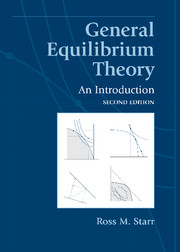Book contents
- Frontmatter
- Contents
- List of illustrations
- Introduction to the second edition
- Preface to the second edition
- Preface to the first edition
- Table of notation
- Table of assumptions
- A General equilibrium theory: Getting acquainted
- B Mathematics
- C An economy with bounded production technology and supply and demand functions
- D An economy with unbounded production technology and supply and demand functions
- E Welfare economics and the scope of markets
- F Bargaining and equilibrium: The core
- 21 The core of a market economy
- 22 Convergence of the core of a large economy
- G An economy with supply and demand correspondences
- H Standing on the shoulders of giants
- Bibliography
- Index
21 - The core of a market economy
from F - Bargaining and equilibrium: The core
Published online by Cambridge University Press: 05 June 2012
- Frontmatter
- Contents
- List of illustrations
- Introduction to the second edition
- Preface to the second edition
- Preface to the first edition
- Table of notation
- Table of assumptions
- A General equilibrium theory: Getting acquainted
- B Mathematics
- C An economy with bounded production technology and supply and demand functions
- D An economy with unbounded production technology and supply and demand functions
- E Welfare economics and the scope of markets
- F Bargaining and equilibrium: The core
- 21 The core of a market economy
- 22 Convergence of the core of a large economy
- G An economy with supply and demand correspondences
- H Standing on the shoulders of giants
- Bibliography
- Index
Summary
Bargaining and competition
The model we have been using so far is competitive in a rather refined sense. All agents act as price takers. They treat prices parametrically, as variables that they cannot control and to which they must adapt. The prices themselves are set by an impersonal market mechanism (idealized as the Walrasian auctioneer). The assumption that individual buyers and sellers are powerless to affect market prices reflects one idea of the notion of competition, that the market is so large that individual actions have no impact. But that makes up only half of what we mean by competition. In ordinary usage, we say competition occurs when each economic agent tries to do as well as possible by making the most advantageous deals he can. This is the idea of competition as conflict. One of the major achievements of modern general equilibrium theory is that we can demonstrate formally that these two notions of competition are equivalent. We can show mathematically that a model of bargaining and deal making where each buyer and seller tries to get the best deal possible leads to a price-taking equilibrium in a large economy. Hence, we can demonstrate the soundness of the informal notion that large economies leave individuals strategically powerless. We will present a concept of the outcome of strategic bargaining known as the core of the market economy. The core appeared in Chapter 3 as the contract curve.
- Type
- Chapter
- Information
- General Equilibrium TheoryAn Introduction, pp. 251 - 255Publisher: Cambridge University PressPrint publication year: 2011



